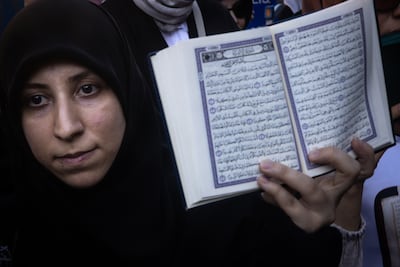Last month, incidents of Quranic desecration in Sweden and Denmark unleashed a visceral reaction in the Muslim world, precipitating significant diplomatic and geopolitical tension.
In the West, the burning of the Quran in two Scandinavian countries has led to debates about the intersection between geopolitics and the need for states to support respect for faith.
In an era of increased geopolitical competition and with the Organization for Islamic Cooperation calling for a downgrade in relations as a response, Western states should do more to respect the practice of faith in their countries.
The book burnings resulted in palpable diplomatic tension with the Muslim world and significant geopolitical consequences.
Within days, the Swedish envoy to Iraq was ousted and Saudi Arabia summoned the Swedish charge d’affaires.
Countries such as Egypt also summoned the Danish envoy to inform them of their condemnation and resentment of the desecration.
The stance that Muslim-majority countries have taken was further elevated through an emergency meeting held by the OIC. This ‘extraordinary’ session, consisting of the organisation's Council of Foreign Ministers, called for its 57 member states to consider downgrading relations with Sweden and Denmark.
The Quran burning in Sweden was particularly ill-timed as it came during tense negotiations for the country's accession to the Nato alliance following Russia’s invasion of Ukraine.
Turkey had been the primary impediment to Sweden’s admittance to the Nato security umbrella, with the Turkish foreign minister, Hakan Fidan, tweeting that it was “unacceptable to allow anti-Islam protests in the name of freedom of expression”.
The collapse in relations between the West and Russia following the latter’s invasion of Ukraine also has implications for these issues. Scandinavian governments have accused Moscow of engineering a disinformation campaign to take advantage of the burning incidents.
The Swedish minister for civil defence, Carl-Oskar Bohlin, stated that [Russia] has been “amplifying incorrect statements such as that the Swedish state is behind the desecration of holy scriptures”.

The substantial diplomatic and geopolitical consequences following acts of religious hatred should elevate the debate about respect and protection of faith in Western countries to another level.
As the West seeks to reassert its influence in the Middle East, incidents such as these are not only debasing to Islam but are also a further wedge to divide the Islamic world from the West.
Scandinavian leaders are rightly recognising these events as an opportunity for change. The Swedish Prime Minister Ulf Kristersson drew a connection between them and Sweden and Denmark’s geopolitical situation, where the countries “are in the most serious security policy situation since Second World War”.
These events have created an unhelpful perception that their countries are considered “facilitators of insult and denigration of the cultures, religions and traditions of other countries”.
By bringing geopolitical considerations into specific cases, Denmark is discussing finding a “legal tool” to prevent Quran burnings, specifically when these incidents have security consequences.
Mr Kristersson has similarly “begun work on analysing the legal situation – including the law of order … to consider measures to strengthen our national security and the security of Swedes in Sweden and in the world”.
Leaders are being careful to safeguard the right to free speech as liberal democracies, while putting in place provisions to protect religion.
Sweden and Denmark are two of the world’s most secular states, do not have blasphemy laws and have centuries-old protections for freedom of speech akin to the US First Amendment.
While protests can be blocked if there is a threat to public safety, governments should also consider geopolitical implications.
Aiming to drive a wedge between the West and the Muslim World, Russia can weaponise these events through disinformation. Nuances such as “we don’t like it, but we can’t stop it” will be lost.
Governments should develop a tangible risk mechanism that goes beyond immediate, domestic safety concerns and includes powers to responsibly prevent actions that will jeopardise national security while maintaining freedom of expression.
Broadly, both countries must work with Muslim-majority countries and Muslim communities to repair the damage done by these incidents, both for the well-being of communities and their geopolitical interests.
They should continue to dialogue with the OIC and Muslim-majority states, ensure domestic Muslim communities are protected and listened to with respect, and they should consider the legislative landscape to ensure it reflects their countries’ diversity.
Sweden and Denmark could also consider the anti-hate provisions in Canada, which is another liberal and highly secular country. On the grounds of preventing discrimination, legal provisions exist in Canada to halt actions which incite hatred against identifiable groups where incitement is likely to lead to a breach of the peace
The challenge for Sweden, Denmark, and indeed all liberal democracies, is preventing the weaponisation of free speech. The eventual goal is to engender a culture of tolerance and inclusivity where both the right to free speech and respect for faith communities is defended.
For many countries, this is not only a debate about free speech and respect for religion, but a geopolitical imperative.

